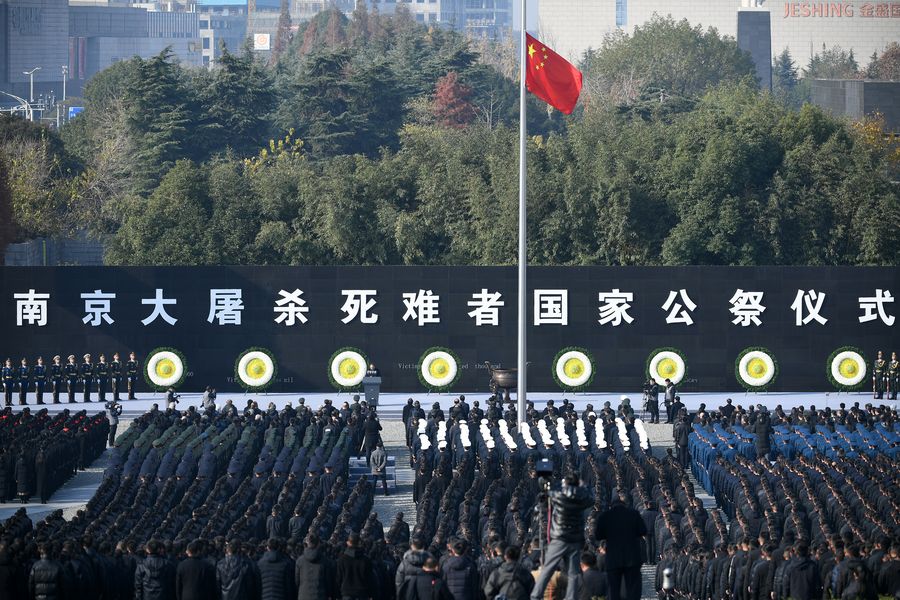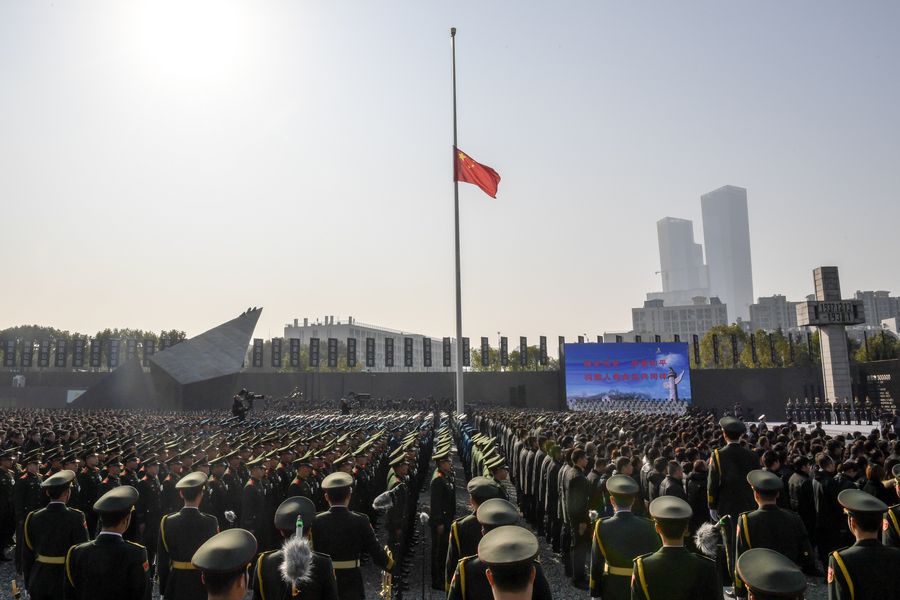More than 8,000 people attended the sixth national memorial ceremony on Friday to mourn the victims of the Nanjing Massacre, which took place when Japanese troops captured the city of Nanjing on Dec. 13, 1937 and brutally killed around 300,000 Chinese civilians and unarmed soldiers in over six weeks, making it one of the most barbaric episodes of World War II.
by Xinhua writers He Leijing, Ma Yujie, Jiang Fang and Qiu Bingqing
NANJING, Dec. 13 (Xinhua) -- In front of the crowd in black, China's national flag flew at half-mast as the nation held a memorial ceremony Friday to mourn the 300,000 victims of the Nanjing Massacre.

The scene of a national memorial ceremony to commemorate the victims of the Nanjing Massacre at the memorial hall for the massacre victims in Nanjing, east China's Jiangsu Province, Dec. 13, 2019. (Xinhua/Han Yuqing)
Pinning a white flower, more than 8,000 people from all walks of life attended the sixth national memorial ceremony in Nanjing, east China's Jiangsu Province.
At exact 10:01 a.m., sirens started to blare and the city came to a halt. On the streets, drivers parked their cars and honked; pedestrians stood still and observed a moment of silence.
Eight large wreaths were presented to the memorial altar by guards of honor.
A total of 82 teenagers read aloud a declaration of peace and citizen representatives struck the Bell of Peace. Thousands of white doves representing hope for peace were released to fly over the memorial square of the Memorial Hall of the Victims of the Nanjing Massacre by Japanese Invaders.
In 2014, China's top legislature designated Dec. 13 as the national memorial day for the victims of the Nanjing Massacre, which took place when Japanese troops captured the city of Nanjing on Dec. 13, 1937 and brutally killed around 300,000 Chinese civilians and unarmed soldiers in over six weeks, making it one of the most barbaric episodes of World War II.

People mourn at a national memorial ceremony to commemorate the victims of the Nanjing Massacre at the memorial hall for the massacre victims in Nanjing, east China's Jiangsu Province, Dec. 13, 2019. (Xinhua/Ji Chunpeng)
"WE LOVE PEACE"
Weather-beaten but determined, 92-year-old Ge Daorong, a survivor of the massacre, silently mourned for the victims outside the memorial hall.
Survivors like Ge are living witnesses of the slaughter, yet the number of registered survivors has decreased to 78 so far this year.
Ge was only 10 when Nanjing fell to the Japanese invaders. He managed to live by taking refuge in the Safety Zone during the mass killing, but his three uncles were not so lucky. Though it has been 82 years, the pain of losing beloved families still hurts.
"I hope all kids in the world would never experience what I went through," said the old man. "And the future generations should never forget history."
Since the 1980s, Ge Daorong has devoted himself to sharing his story. He wrote nearly 100,000 characters of what he witnessed and titled it "Remembering History."
Ge Fengjin, son of Ge Daorong, went to Japan on behalf of his father for testimony meetings this year, to convey the truth and remind people to never forget history. "We are different, but we share the same purpose -- to keep the peace," he said.
Since 1994, a total of 55 survivors have visited Japan to tell their stories. The Chinese government has preserved the survivors' testimonies, recorded in both written and video documents. The documents on the massacre were listed by UNESCO in the Memory of the World Register in 2015.
"We love peace. We wish there will be no war in the world anymore," said Xia Shuqin, another survivor.
LEGACY OF PEACE
Christoph Reinhardt, great-grandson of John Rabe, a German businessman who helped protect many Chinese during the massacre, was among the foreign visitors present at the memorial ceremony.
Regarded as the "Oskar Schindler of China," John Rabe and dozens of foreigners set up a Safety Zone in Nanjing and saved tens of thousands of lives. The business representative of Siemens was called back to Germany in early 1938, taking with him a 10-volume diary that recorded the atrocities committed by the Japanese invaders.
"The first time I came to Nanjing two years ago, I felt like part of me belongs here," Reinhardt said. "Since I went to the former residence of Rabe, part of my soul has lingered in the city. And every time I came here, I felt secure."

A national memorial ceremony to commemorate the victims of the Nanjing Massacre is held at the memorial hall for the massacre victims in Nanjing, east China's Jiangsu Province, Dec. 13, 2019. (Xinhua/Li Bo)
This summer, Reinhardt took his 16-year-old daughter to Nanjing so that the young lady could know more about her forefather.
"After visiting an exhibition hall, the girl was finally sure of the fact that 250,000 lives were saved because of Rabe's feat," he said. "It's no longer a tale to her."
Reinhardt believes the pursuit of peace and love should always be inherited by future generations.
American photographer Chris Magee, who paid his tribute to the victims at the ceremony, is also an heir to such legacy.
His grandfather John Magee, an American missionary who was stationed in Nanjing during the massacre, secretly shot 105 minutes of footage in 1937 documenting the barbarity of Japanese invaders. It is considered the only film record of the massacre.
In 2017, Magee revisited places and took pictures of where his grandfather had lived in Nanjing.
"I walked the city of Nanjing, a city reborn from the ashes, and took pictures," said Chris Magee. "I felt the shadows of the past had given way to life and prosperity."
Zhang Jianjun, the curator of the Memorial Hall of the Victims of the Nanjing Massacre by Japanese Invaders, said the international friendship should always be commemorated to plant seeds of peace in the world.
"I hope all of us can inherit the kindness, bravery and integrity left from decades ago, and become promoters of peace," Zhang said.
(Video reporters: Zhao Shitong and Li Guangzheng; video editor: Lin Lin) ■



